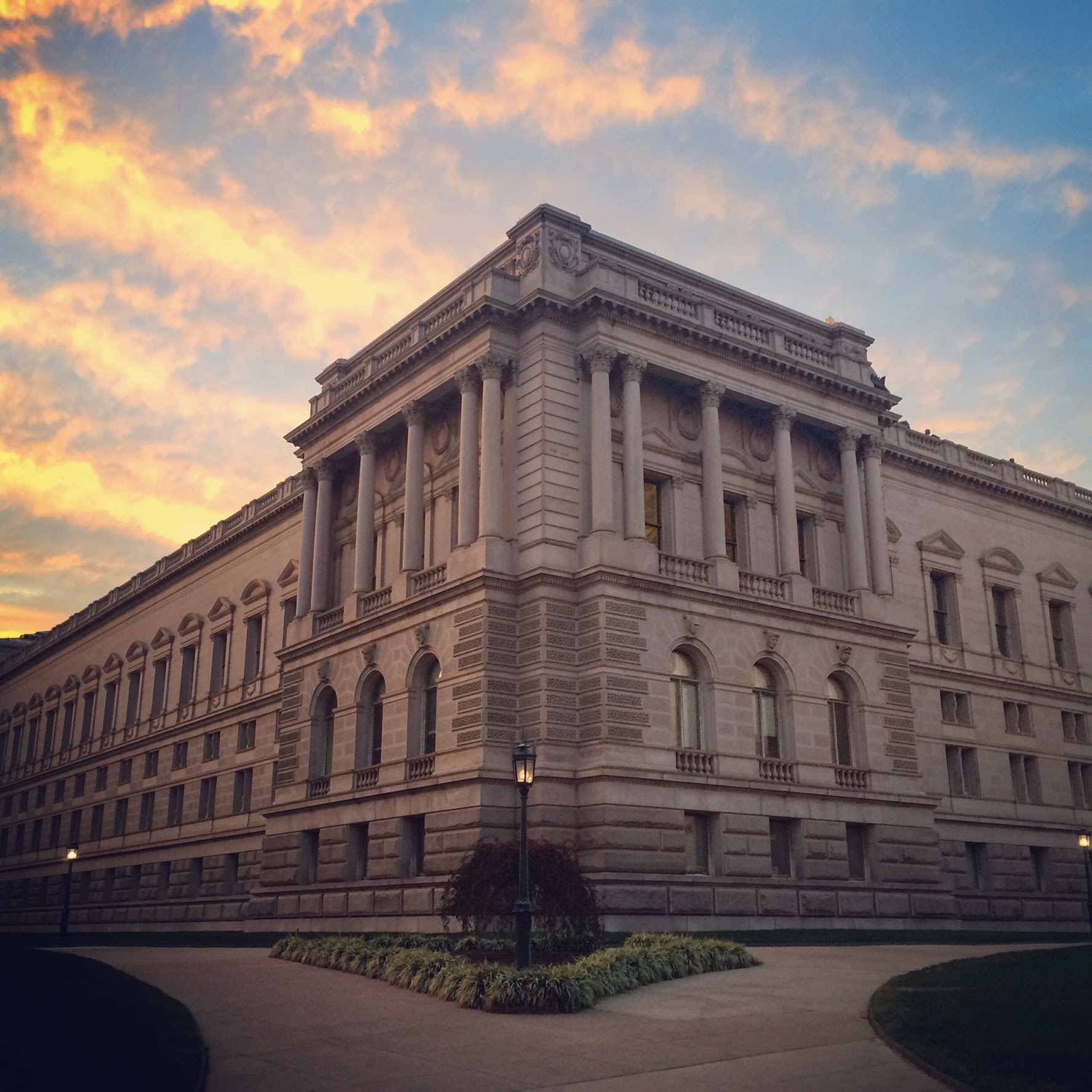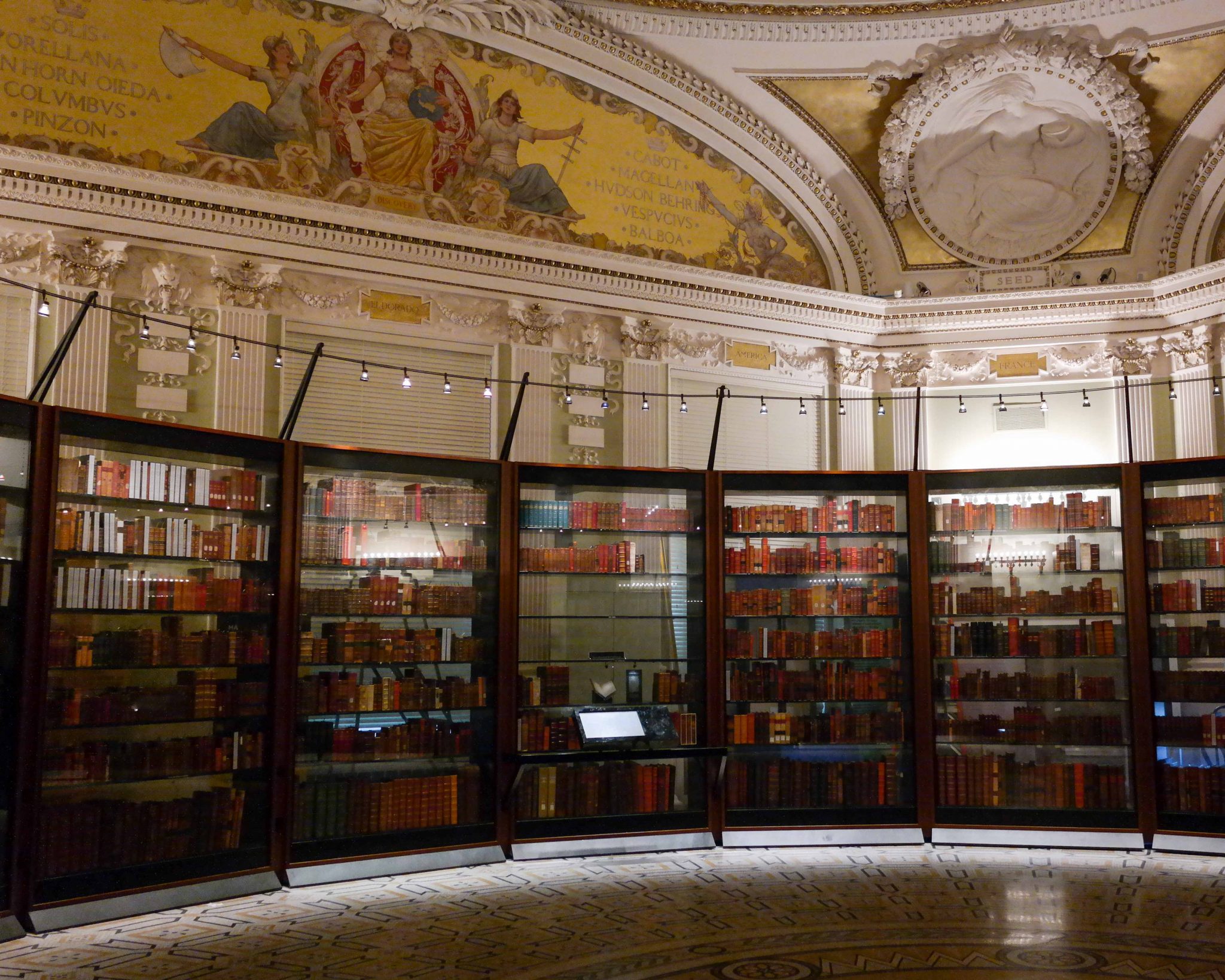Editor's Note
This is the first in a series of guest posts by Rebecca Brenner, a doctoral candidate (ABD) in early American history at American University in Washington, DC. She has served as Secretary of the Society for US Intellectual History since June 2017.
Mr. Jefferson’s Books & Mr. Madison’s War
by Rebecca Brenner
In May 1815, Thomas Jefferson’s library travelled over a hundred miles in ten wagons from Monticello to Washington, DC. When they arrived, the Librarian of Congress arranged them in their original Jeffersonian order. However, transporting 6,700 volumes from just outside Charlottesville to DC, in ten wagons during wartime, was the easy part. A reexamination of the congressional acquisition of Jefferson’s books illuminates competing visions for American democracy and national identity from 1814 through 1815. This story is largely forgotten precisely because Jeffersonian epistemology and ideology prevailed.
In 1800, Congress established the LOC to facilitate Congressmen’s legal and policy research. The original LOC offered only legal texts and parliamentary proceedings. But like today, it stood on Capitol Hill among some of the most important rooms of American government. In July 1814, the second ever Librarian of Congress went to Virginia Springs for the remaining summer. Assistant Librarian J.T. Frost was left in charge of the books. As British troops approached DC, Frost moved the congressional library to safety in Virginia on the last possible day: August 21, 1814. Frost sent John Wilson to obtain a cart and four oxen, which arrived in Washington at dusk to transport the most valuable papers and records to Virginia. That night of August 21, British troops entered DC. As they torched buildings, the most valuable books, four oxen, and presumably John Wilson rode off into the warm Virginia night.[1]

Library of Congress – Jefferson Building
The War of 1812 and especially the burning of DC symbolized a struggle to define America’s identity and meaning. British torched the Executive Mansion, Treasury Department, Capitol, and lastly the LOC. Many Americans at the time interpreted burning the LOC to signify an uncivilized enemy. Newspapers across the country condemned the burning as savagery.[2]But since the LOC retained at least one copy of each book, Jefferson’s offer was more about an ideology than necessity.
Jefferson’s books once filled three rooms in Monticello. For Jefferson, being an avid reader was a form of moral exercise. The burning of Washington presented an opportunity for Jefferson’s books to educate the nation by becoming a national library.
Jefferson’s book log is a window into his mind and epistemology. He divided his books into the categories of “History, Philosophy, and Fine Arts.” These categories adapted sixteenth-century philosopher Francis Bacon’s division of knowledge: Memory, Reason, and Imagination. Jefferson’s History section and Bacon’s Memory section contained a posteriori
knowledge, meaning that people discovered it through observation. Jefferson’s Philosophy and Bacon’s Reason sections contained a priori
knowledge, meaning people deduced it through analysis of their observations, not observations alone. Jefferson’s Fine Arts and Bacon’s Imagination sections contained knowledge that came into existence independent from both observations and deductive reasoning.[3]
What could be known about the physical universe comprised Jefferson’s History section, while his Philosophy section was more concerned with laws and reason. Religion was a subcategory under Philosophy, which would bother the Federalists. Jefferson’s copy of the Quran, which he had purchased as a law student in 1765, was a highlight of his Philosophy section. Its placement next to a Hebrew Bible acknowledged, according to Jefferson’s Qur’an by Denise Spellberg, an “affinity between the Jewish and Muslim varieties of monotheism and that of the Deism and Unitarianism he would espouse, all these traditions similarly rejecting the Trinity of normative Christianity.”[4]Before 1814, Jefferson had intended to donate his books to his National University, the University of Virginia. Offering his library instead to the federal government reflected rising nationalism during the War of 1812.
Jefferson included a note to the friend he entrusted to present the materials to Congress: Samuel H. Smith. Smith was chief editor of the Daily Intelligencer newspaper and attended Congress every day. Jefferson wrote: “The vandalism of our enemy has triumphed at Washington over science as well as the arts by the destruction of the public library with the noble edifice in which it was deposited.”[5]He continued, explaining that his own combination of his opportunities for leisure, diligent nature, financial resources, and passions for knowledge and learning enabled the creation of an unprecedented library. Smith replied enthusiastically. Following a complex appraisal process, Congress met in fall 1814 to discuss acquisition of Jefferson’s 6,700 volumes for a price of $23,950.
Overflowing the fall 1814 congressional agenda were questions of where to meet, whether to relocate the Capitol, and how to replace what the British had burned. Opinions split along partisan lines.[6]Federalists and Jeffersonians each ascribed to a culture that determined their economic, political, religious, and social views, as well as general outlook. Federalists believed not only in a strong, central government, but also in commerce, taxation, and religious guidance from Protestantism.
In contrast, the Democratic Republicans were emblematic of Jeffersonian ideology. They were men of status who exploited enslaved Africans to maintain their affluence. They valued self-sufficient agrarianism but relied on the Africans who they enslaved. Rooted in colonial times, Protestant religiosity was less influential in the American south and west than it was in the northeast. A Jeffersonian concept of religion promoted freedom of conscience. Political loyalties and lines of reasoning on each side reflected clashing worldviews.
Jefferson compared burning the LOC to incidents of destruction in European history. He wrote that London burned at a thousand years old, but DC was “in its teens.”[7]Jefferson’s offer letter conveys his intention to make the US an intellectual leader in international affairs. From Monticello, he followed the library debates through Samuel H. Smith. In October 1814, Smith informed Jefferson that the Democratic Republican majority in the Senate passed the acquisition proposal. The House of Representatives then considered the bill, launching into a debate over the value of a library and the nature of the selection. Despite pressing matters such as the War of 1812, members received a full week’s hold to read Jefferson’s lengthy book log.[8]
Congressman Goldsborough, Chairman of the Joint Committee on Jefferson’s Library, proposed a resolution to buy the books, but Representative Cyrus King of Massachusetts encouraged his colleagues to oppose it. King associated books about French philosophy with the horrors of the French revolution, suggesting books were so powerful that they could spur a revolution. By January 1815, he proposed sending the quote “godless” French philosophy books back to Jefferson at no expense to the former President.[9]
Congressman John W. Hulbert, also a Federalist from Massachusetts, suggested instead to burn Jefferson’s French philosophical and non-Protestant religious texts. I assume that the irony of burning the books wasn’t lost on him. Still, Representative Hulbert opposed the “irreligious and immoral” books from Monticello. For most Federalists, Enlightenment philosophy was too close to Deism. The chaos and violence of the French Revolution and its aftermath represented many their fears for the fate of a quote “-godless” society. The Federalists proposed an amendment to exclude “godless” texts.
Moderate Democratic Republicans acknowledged that some books were more practical than others, but that these did not detract from the library’s overall utility. Furthermore, they argued that the 23 thousand dollars was generous for former President Jefferson’s unprecedented library. For the better part of the next year, debates over the acquisition spread like fire up and down the east coast. Returning to these debates recasts the library donation and resistance as political acts in the struggle between Federalists and Jeffersonians. In spring 1815, the bill for congressional acquisition of Jefferson’s library passed the US House or Representatives in a close 81-71 vote.[10]
The acquisition debates receded from American collective memory precisely because the victors cast Jefferson’s generous offer of his sacred library as inevitable, timeless, and central to American national identity. The “Jefferson’s Library” exhibit has been a highlight of the LOC museum since the exhibit’s inception in 2000, for the LOC’s bicentennial anniversary. Visitors travel from around the globe to see it. Mahogany circular shelves with glass encasement present Jefferson’s books in as close to their original order as possible. Victors typically determine official history and popular memory. But in reality, the tenacity of the library debates is much more interesting.

Jefferson’s Library
________________
[1]William Dawson Johnston, History of the Library of Congress, Volume 1, 1800-1864 Washington, DC: Government Printing Office, 1904 https://archive.org/stream/historyoflibrary01john/historyoflibrary01john_djvu.txt.
[2]Peter Manseau, One Nation Under Gods: A New American History (New York: Little Brown and Company, 2015)
[3]James Gilreath and Douglas L. Wilson, Editors, Thomas Jefferson’s Library: A Catalog with the Entries in His Own Order(Clark, New Jersey: The Lawbook Exchange, Limited).
[4]Denise A. Spellberg, Thomas Jefferson’s Qur’an: Islam and the Founders (New York: Random House, 2013)
[5]Quoted in Johnston, History of the Library of Congress (1904).
[6]Debates and Proceedings of the Congress of the United States, Thirteenth Congress Third Session (Washington: Printed and published by Gales and Seaton, 1854) 23
[7]Quoted in Johnston, History of the Library of Congress (1904).
[8]Peter Manseau, One Nation Under Gods: A New American History (New York: Little Brown and Company, 2015)
[9]Debates and Proceedings of the Congress of the United States, Thirteenth Congress Third Session (Washington: Printed and published by Gales and Seaton, 1854)
[10]Debates and Proceedings of the Congress of the United States, Thirteenth Congress Third Session (Washington: Printed and published by Gales and Seaton, 1854)

2 Thoughts on this Post
S-USIH Comment Policy
We ask that those who participate in the discussions generated in the Comments section do so with the same decorum as they would in any other academic setting or context. Since the USIH bloggers write under our real names, we would prefer that our commenters also identify themselves by their real name. As our primary goal is to stimulate and engage in fruitful and productive discussion, ad hominem attacks (personal or professional), unnecessary insults, and/or mean-spiritedness have no place in the USIH Blog’s Comments section. Therefore, we reserve the right to remove any comments that contain any of the above and/or are not intended to further the discussion of the topic of the post. We welcome suggestions for corrections to any of our posts. As the official blog of the Society of US Intellectual History, we hope to foster a diverse community of scholars and readers who engage with one another in discussions of US intellectual history, broadly understood.
Rebecca, thanks so much for sharing this post with our readers. Given the national narrative that has accrued around Jefferson’s donation, the fact that at the time some Federalists suggested not merely returning the “godless” or “French-influenced” volumes but actually burning them packs a real wallop. And it runs completely counter to the narrative that associates anti-intellectualism with the Democratic Republicans and their agrarian focus. I am grateful that cooler heads prevailed!
Interesting post. The LOC evolved into a great library in terms of materials generally (including manuscript collections), though I think it has had ups and downs over the years, and an increasing percentage of the collection I believe is stored off-site. I used the LOC when I was working on my diss. some years ago, a mixed experience but necessary for what I was doing. Haven’t really used it since, b/c for me it’s a not-short subway ride away and it’s not all that user-friendly for some understandable reasons. (Btw, some years ago, and it may still be the case, ambient noise in the main reading room, from the sound of tour groups or whatnot echoing above, was a problem, and I usually took earplugs if I had to be in the reading room for any length of time. Also, the turntable or belt or whatever it’s called near the main desk made a horrible squealing sound. After a while, I dropped a note about this into an anonymous suggestion box and to my pleasant surprise it was fixed; maybe just needed some WD-40.)